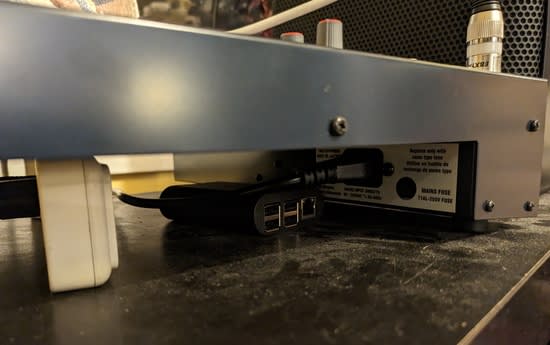PortAudio M1 Latency
post by jefftk (jkaufman) · 2023-10-04T19:10:13.021Z · LW · GW · 5 commentsContents
5 comments
I recently tried to get my whistle-controlled bass synthesizer working on my Mac, as a backup to my Raspberry Pi version. [1] It's written on top of PortAudio, a cross-platform audio library, so getting it to compile and run was mostly a matter of getting the library installed, which went quickly. Unfortunately, the latency was far too high to be useful as a real-time musical instrument.
Testing with PortAudio's demo paex_read_write_wire.c
[2] with suggestedLatency changed from
defaultHighOutputLatency to
defaultLowInputLatency I see:
Input device # 2.
Name: MacBook Pro Microphone
LL: 0.0528542 s
HL: 0.0621875 s
Output device # 3.
Name: MacBook Pro Speakers
LL: 0.0187083 s
HL: 0.0280417 s
Num channels = 1.
This is 72ms of round-trip latency, or 3,156 samples. You can easily
hear the latency, and it's pretty painful for live music. It's even
higher than the 67ms I see in the web
browser. [3] Changing FRAMES_PER_BUFFER from the
default of 512 to 128 doesn't have any effect, so I think this is
lower level buffering.
I also tried with a Scarlett 2i2
audio interface, and latency wasn't any lower. Setting
PA_MIN_LATENCY_MSEC also doesn't do anything. I'd try
turning off ambient noise
reduction but this option doesn't exist for
M1 Macs.
I don't have this problem when running the Reaper DAW so it's definitely possible to get low latency on this machine. I wonder if there's some kind of default processing running on the audio system, and Portaudio doesn't ask to turn it off?
(I could go back to running my code as a Reaper plug-in, but I'd much rather have something stand-alone.)
[1] In setting up at Adirondack
Dance Weekend I couldn't find one of my two Pis. It turns out I'd
missed that it was under my mixer and forgotten to pack it:
[2] Built with gcc -I/opt/homebrew/include/ -L/opt/homebrew/lib/
-lportaudio paex_read_write_wire.c -o paex_read_write_wire
after brew install portaudio to get the library.
[3] Suspiciously this is quite a bit higher than I used to see on my Intel Mac. I used to get 19ms in Chrome and 14ms in Firefox, and I'm now getting 67ms in Chrome and 64ms in Firefox.
Comment via: facebook, mastodon
5 comments
Comments sorted by top scores.
comment by npostavs · 2023-10-04T21:53:30.784Z · LW(p) · GW(p)
Testing with PortAudio's demo paex_read_write_wire.c [2]
It looks like this uses the blocking IO interface, I guess that adds its own buffering on top of everything else. For minimal latency you want the callback interface. Try adapting test/patest_wire.c or test/pa_minlat.c.
comment by philip_b (crabman) · 2023-10-12T05:47:57.756Z · LW(p) · GW(p)
I've been thinking of buying an M1 MacBook because everyone says that Apple's sound system is great and works out of the box correctly with low latency and no problems, unlike Windows+Wasapi, Windows+ASIO, and Linux. I want to use it for music stuff without an external audio interface. How true is this and would you recommend it?
Replies from: jkaufman↑ comment by jefftk (jkaufman) · 2023-10-12T10:44:24.135Z · LW(p) · GW(p)
I get great latency with Reaper, so my guess is as long as you're using standard audio tools you'll be fine?
My issue is that I want a custom stand-alone program, and there's something extra you need to do to get good latency I'm missing.
Replies from: crabman↑ comment by philip_b (crabman) · 2023-10-12T17:20:46.731Z · LW(p) · GW(p)
Are you able to play sounds using other programs (e.g. open a YouTube video in the background) while getting great latency in reaper or in something similar to reaper?
Replies from: jkaufman↑ comment by jefftk (jkaufman) · 2023-10-13T01:13:48.384Z · LW(p) · GW(p)
Yes
